 MyDogBreeds
MyDogBreedsParson Russell Terrier is originated from United Kingdom but Doxiepom is originated from United States. Parson Russell Terrier may grow 9 cm / 4 inches higher than Doxiepom. Both Parson Russell Terrier and Doxiepom are having almost same weight. Both Parson Russell Terrier and Doxiepom has almost same life span. Both Parson Russell Terrier and Doxiepom has same litter size. Both Parson Russell Terrier and Doxiepom requires Moderate maintenance.
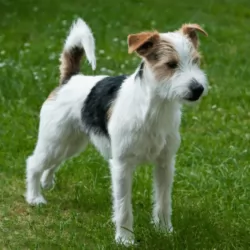 The Parson Russell Terrier hails from England and is a small to medium sized dog dating back to the 18th century. It is believed that Reverend John ‘Jack’ Russell was the developer of this dog. The Parson has always been involved with England’s sport of foxhunting.
The Parson Russell Terrier hails from England and is a small to medium sized dog dating back to the 18th century. It is believed that Reverend John ‘Jack’ Russell was the developer of this dog. The Parson has always been involved with England’s sport of foxhunting.
They’re spritely and quick and have been able to keep up on a hunt and take on a fox in its lair. The dog was first recognized in 1990 in the United Kingdom as the Parson Jack Russell Terrier and in America in 1997.
All the top kennel clubs recognize this dog as the Parson Jack Russell Terrier.
The Doxiepom is a small dog known as a designer breed which has originated from crossing the well known Dachshund dog with another well known pure-breed dog, the Pomeranian.
This has resulted in the hybrid breed – the Doxiepom.
Both these pure bred dogs have their own history each but the Doxiepom is a new dog breed. It is believed that this mix of Pomeranian and Dachshund was originally developed in the United States in the 1990’s and while he doesn’t have much of a history, you can have a look at the history of the parent dog breeds.
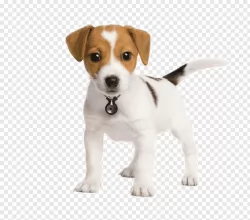 The Parson Jack Russell is essentially a white dog with black and tan or orange-fawn patches. He can be tri-colored too. The coat is either smooth, rough or broken.
The Parson Jack Russell is essentially a white dog with black and tan or orange-fawn patches. He can be tri-colored too. The coat is either smooth, rough or broken.
He stands at between 33–36cm tall at the withers and weighs between 5 and 8kg. Unlike the Jack Russell, the Parson Russell Terrier has longer legs. He has some longer hair on the head, legs and body. The ears are floppy wit the tip pointed forward. The tail has always been docked but when left long it it held high, slightly curving over the back.
Feisty, brave, cheeky and alert, the Parson Russell Terrier is an energetic dog who gets on well with children as he knows that this is essentially where his games come from.
He is bold and clever and you’ll be able to have him trained and socialized without any trouble. These little dogs are full of life and they are protective of their humans and their property, making excellent watchdogs.
The Doxiepom is a small dog - a cross between the Dachshund and the Pomeranian, and this means he can have characteristics from each of these breeds.
They’re short dogs, standing at roughly 12cm to 27cm. A full grown Pomeranian Dachshund mix can weigh between 3kg and 12kg.
With a fairly long body from the Dachshund side, he has floppy ears or they can be semi-erect and the tail is long.
You can’t really say what the dog will look like exactly and the coat may be long or short with some of the coat colors being tan, black or brown.
Their dependent nature can mean these little dogs battling with separation anxiety, and he is a dog that doesn’t like being left alone for long periods of time.
He easily attaches himself to just one member of the family while being friendly and loving to everyone else as well.
They’e fun loving, playful dogs and want to be involved in their family’s activities, whether indoors or out. They’re friendly, but are aloof with strangers. He makes a great watchdog too, barking when strangers enter the property.
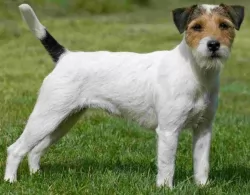 In general the Parson is a friendly,loving dog, fairly small but packed full of feisty personality.
In general the Parson is a friendly,loving dog, fairly small but packed full of feisty personality.
They make excellent pets for the entire family. He is an intelligent dog, but typical of most terriers he can be stubborn, but this can easily be fixed with training and socialization. With good care, he’ll make you a wonderful little pet and companion.
One of the strong characteristics of the the Doxiepom is that he shares a strong bond with his human family.
He is such a amicable little dog, ready to join in with the children in their games as well as in the activities of the adults.
He craves human companionship, and if you provide him with a happy home, he promises to give you devoted companionship throughout his life.
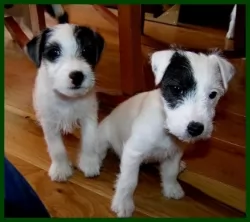 Your Parson Jack Russell can live to be between 12 and 15 years but nonetheless he does have some breed-related health issues to watch for.
Your Parson Jack Russell can live to be between 12 and 15 years but nonetheless he does have some breed-related health issues to watch for.
Eye conditions which can affect this dog include primary lens luxation,cataracts, corneal dystrophy and progressive retinal atrophy. With cataracts the lens of the eye develops a cloudy look resulting in poorer vision and sometimes blindness. Cataract surgery is available for dogs.
Your Parson Jack Russel should be lean and muscular and always full of energy. Avoid feeding him unhealthy treats which can lead to obesity and other health problems.
All kinds of parasites such as ticks, fleas and worms can invade your dog’s body. Roundworms, hookworms and tapeworms can cause havoc with their health and some of these parasites can even be transmitted to humans. It’s why it is important to get your puppy to the vet to be de-wormed and to get his first injections.
A liver disorder known as portosystemic shunt can mean that some of the blood supply doesn’t get to the liver and it doesn’t function properly. This will mean the liver can’t remove toxins from the bloodstream effectively.
The Doxiepom is a little dog who isn’t going to cost you a lot of time at the vet, however there are some typical dog illnesses that you will do well to know about.
Generally the Doxiepom has a lifespan of about 12 to 16 years and with good care, your pet can reach this age too.
As far as health problems go, your dog could be affected, although it is unlikely, as he is a robust dog breed.
Your pet could inherit health problems more common to either of the breeds. Little dogs suffer with their own set of heath problems and these could be back problems, dental- and eye disease and allergies.
A common health problem with a small dog like this is obesity. They don’t need a lot of food but because they’re so friendly and entertaining, some owners over-feed them.
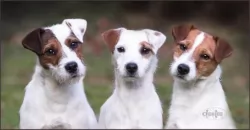 The Parson Russell Terrier has different coat types – the smooth and rough and both will require regular brushing. Rough coats will require plucking or clipping to avoid matting.
The Parson Russell Terrier has different coat types – the smooth and rough and both will require regular brushing. Rough coats will require plucking or clipping to avoid matting.
Check his eyes and ears regularly. Look inside his ears for excess wax and dirt which could lead to an ear infection. His nails should also be trimmed.
The best thing you can do for your Parson Russell Terrier if you don’t want your pet producing puppies is to have it spayed or neutered. Spaying for females or neutering for males decreases the likelihood of certain types of cancers too so it can be beneficial.
Diet is hugely important for a Parson Russell Terrier and the food you decide for him can impact his health. Many time those ‘treats’ you feed your pet do nothing more but give him a stomach ache.
It's tempting to pop chocolates, popcorn, nuts and ice cream into your pets mouth when he is so adorable but in the long run it is shortening his life. All he basically requires and needs is a simple, consistent diet of the top commercially manufactured foods mixed with some tasty home made food from time to time.
Boiled chicken, brown rice and vegetables such as sweet potatoes, carrots and spinach will do your pet wonders. Ensure he always has fresh, cool water available to him.
The Doxipom has moderate grooming requirements, shedding somewhat throughout the year, so brushing him twice a week will keep the coat shiny and healthy.
If your pet has turned out to have more long hair than short, he may require some professional grooming. His nails will also need clipping and his ears will also need to be checked for infection.
Small dogs often battle more with dental and gum problems, and plaque and tartar buildup results when food gets trapped between the teeth, leading to gingivitis which can lead to premature tooth loss. Keeping the teeth clean is therefore important.
Small dogs have quicker metabolisms than big dogs and they also mature faster than the larger dogs. Smaller dogs actually require more calories per kilogram than big dogs because they burn up energy faster than larger breeds.
It is therefore important to feed your small dog the right amount of food to support their growth rate and to maintain weight in adulthood. Homemade foods for your Doxiepom are always wonderful, but of course many people who work make use of some of the good commercially manufactured dog foods out of sheer convenience.
Go for the better quality brands which have top ingredients in them so as to avoid deficiencies.
Raw meat should also make up part of the diet – fish, chicken and red meat. Always make sure your pet has access to fresh, cool water.